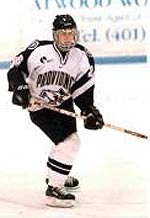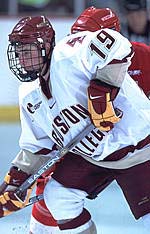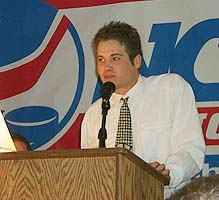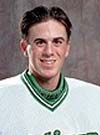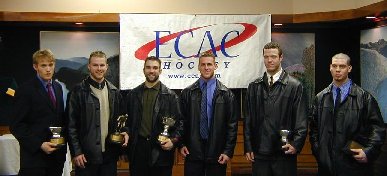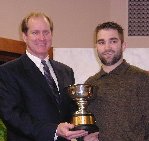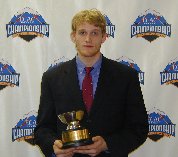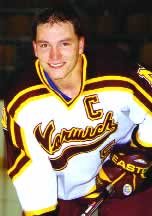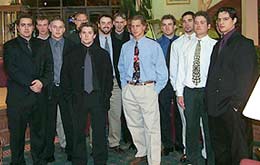Four of the top five teams in the season-ending USCHO.com poll meet this weekend in the NCAA Division III Frozen Four at Rochester Institute of Technology.
The top Eastern seed, RIT, hosts second West seed Wisconsin-River Falls in one semifinal, while the top seed from the West, Wisconsin-Superior, takes on third Eastern seed Plattsburgh.
The ECAC West champion Tigers drubbed Lebanon Valley 8-1 and 10-2 in quarterfinal action at RIT last weekend to advance.
River Falls, the tournament’s Pool C at-large bid, trounced New England College 8-1 on home ice last Friday, and hung on to win 2-1 on Saturday to earn the semifinal bid.
Superior advanced to the early semifinal game with a quarterfinal series sweep over MIAC champion St. John’s.
Last Friday, the Yellowjackets held on to a 5-4 win after the Johnnies scored two power play goals during a third period major penalty. Saturday, Superior shut out St. John’s 4-0 to move on.
Plattsburgh accomplished something last weekend that no other team has done: defeat the Middlebury Panthers in the NCAA tournament on home ice. And the Cardinals did it not once, but twice.
The SUNYAC champs scored two third-period goals 43 seconds apart, and goalie Niklas Sundberg faced 43 shots, as the Cardinals downed Middlebury 3-1 in the first game of the series.
Saturday night, the Panthers scored two goals in the third to tie the contest at two apiece. Plattsburgh’s Paul Dowe got the game winner with a little over five minutes left, and his team added a couple of empty-netters to advance past Middlebury 5-2.
With four of the best teams in Division III, it promises to be a great weekend of hockey.
But which teams have the advantage in the semifinal round?
Let’s take a look.
Wisconsin-Superior (29-3-1) vs. Plattsburgh (27-5-0)
This is the second year in row that Wisconsin-Superior and Plattsburgh have met in the NCAA final four.
Last year, it was for third place.
This year, one of them will be compete for the national championship.
First-year Superior head coach Dan Stauber took over the program just over a month before the Yellowjackets started practice in the fall, when long-time coach Steve Nelson left the team.
After what Stauber called “some rocky roads” in which his squad dropped three of four league games, the Yellowjackets have been on a roll, unbeaten in 23 games. The only mark on that record is a tie with River Falls in the NCHA championship series.
This is the third consecutive final four and the ninth NCAA tournament for Superior. The Yellowjackets have never won a national championship.
Bob Emery is in his 12th season behind the Plattsburgh bench. During his tenure, the Cardinals have won one national championship, in 1992, and have now been in the tournament nine times.
In the last 17 games, starting with a win over Middlebury on home ice January 16, the Cardinals have only one loss, to Potsdam in the three-game SUNYAC championship.
Before the Middlebury win, Plattsburgh weathered a 3-3-0 slump bracketing the semester break.
Which of these teams, if either, has the edge in advancing to the championship?
Let’s compare:
Offense
Despite having the size necessary to play a physical game, Superior likes to play the skill game.
The Yellowjackets are averaging 4.76 goals a game, eighth best in the country.
Leading the team are NCHA All-Stars Ivan Prokic, with 22 goals and 16 assists, and Jeff Glowa, with 14 goals and 23 assists. Thirteen of Prokic’s goals have been on the power play, while Glowa has three tallies short-handed.
Three other forwards have 30 points or more: sophomores Colin Kendall and Ryan Kalbrenner, and freshman Rob Ziemmer. Still four more Yellowjackets have 20 or more points.
Plattsburgh’s strength comes from a balanced offensive attack. As Emery told USCHO, “We don’t have a number-one line. All our lines work hard.”
Atop the season scoring stats for the Cardinals, who are sixth in the nation with 5.06 goals per game, are two sophomore forwards, Jason Kilcan and Brendan Hodge. Kilcan is the top goal scorer with 20, while Hodge is the leader in assists with 26.
Junior forward Mark Colletta has 34 points, and senior defenseman Bryan Murray has 30. Five more Cardinals are over the 20-point mark on the season.
Defense
Superior is tied with RIT for third-fewest goals allowed, 2.13.
The stingy Yellowjackets defense has allowed fewer than 24 shots on goal per game, but did give up 65 shots on goal in two games against St. John’s in the quarterfinals. Superior has allowed four or more goals only five times all season.
Superior’s defensemen are not a big offensive threat. Only one has more than 10 points, All-NCHA pick Milan Tomaska with four goals and 15 assists.
Plattsburgh is led on the blue line by Murray, along with the veteran corps of Peter Ollari, Bobby Owen, Sean Chaytors, and Andre Carriere.
Cardinal opponents have averaged 2.31 goals per game, sixth best in the country.
Plattsburgh, like the Yellowjackets, has given up four or more goals only five times during this campaign.
The Cardinals have allowed opponents almost 29 shots on goal per game.
Goaltending
Both squads have benefited from terrific goaltending this season.
Superior’s Nate Ziemski, a transfer from Cortland, saw his first action in a year and a half this season. Despite his talent, that time off was a concern for Stauber, who said that Ziemski has “responded very well.”
In 31 starts for the Yellowjackets, the junior has a 27-3-1 record, with a .910 save percentage. Ziemski is sixth in the nation with a 2.12 save percentage.
Ziemski also leads the nation in minutes played, having been between the pipes for all but seven periods this season.
Plattsburgh’s junior goalie Sundberg has been outstanding in his first season not platooning in goal.
In his 30 starts, the native of Sweden is 25-5-0 with a .924 save percentage and a 2.25 GAA.
Sundberg’s biggest wins came in the Middlebury series, when he stopped all but 3 of 78 shots, for a 1.50 goals against average, and a save percentage of .962.
Special Teams
Superior’s power play and penalty kill have been fairly average, scoring on about 22 percent of power plays, and allowing goals 18 percent of the time when down a man. However, the Yellowjackets have not allowed a shorthanded goal, while scoring 11 themselves.
Plattsburgh’s power play has also been average, scoring on just over 23 percent of its power play chances, and giving up four shorthanded goals.
But the Cardinal penalty kill has been spectacular. Plattsburgh’s opponents have scored on less than ten percent of their chances, and the Cardinals, with 17 shorthanded goals, have only allowed one more than they’ve scored when killing off the man advantage.
Intangibles
There may not be any difference here.
Both teams have a similar number of players with playoff experience. Both teams play on a smaller ice sheet like the Ritter Arena.
Despite being another New York State team, Plattsburgh hasn’t been to RIT since the 1997 NCAA quarters, so no players on either team are familiar with the rink.
Plattsburgh may have a few more fans there, but it’s anybody’s guess who the large contingent of RIT fans will support.
One thing that could be considered to count against Plattsburgh in this category, but is probably meaningless: the Cardinals have had a history of laying an egg in the semifinals in recent visits.
Okay, so who has the upper hand in this one?
Superior has a slight advantage in defense, having allowed fewer shots on goal, and being used to getting physical in the tough NCHA.
Plattsburgh’s depth gives the Cardinals a bit of an edge on offense.
Goaltending is probably a toss up. Sundberg has been stellar down the stretch, but has had a couple of erratic games this season. Ziemski has a bit lower save percentage than his opponent, and if the Cardinals can muster 30 or more shots on goal, they may have the advantage.
Special teams lean toward Plattsburgh, with the Cardinals stopping more than 90 percent of their opponents chances, and Superior scoring on only 21 percent of their power plays.
Intangibles? Neither has an edge here, although an advantage in numbers from the Cardinal faithful may help a little.
This game may very well come down to a couple of big saves or a broken play.
Wisconsin-River Falls (23-8-2) at RIT (26-0-1)
RIT hosts River Falls in the late game in Friday’s NCAA Division III semifinal round.
Behind the bench for the Tigers is Wayne Wilson, in his second trip to the NCAAs in as many seasons as head coach.
River Falls coach Steve Freeman is in his fifth season at the helm. This is his second NCAA tournament as well.
The Falcons got off to a strong start, 8-0-1, but entered a 5-6 slump after that. “We have a young team, 18 freshmen and sophomores, and ran into some tough opponents,” Freeman told USCHO. “But we got through that.”
That young River Falls squad was indeed able to regain its early season momentum.
In its last 14 games, River Falls has but two losses, one of which came at the hands of Wisconsin-Superior in the NCHA finals, and the other to St. Norbert in the conference semifinals. The Falcons have one tie in that stretch, also with the Yellowjackets in the league championship.
RIT’s lone blemish, a 3-3 tie with Oswego, came on January 19, when starting goaltender Tyler Euverman was out with an injury.
This is the second final four in three years for RIT, while the visitors return to the semifinals for the first time since the Tigers upset the Falcons at River Falls in 1996.
RIT has won the Division III title once, in 1985, and won the Division II championship in 1983.
The Falcons have two national championships, the first coming in 1988.
River Falls last won the national title in 1994, after defeating a then-undefeated Fredonia on the Blue Devils’ home ice in the semifinals.
Could history repeat itself for the Falcons? Or is the Tigers’ juggernaut unstoppable?
Let’s break down the numbers:
Offense
RIT has had the nation’s most potent offense this season, averaging a whopping 7.5 goals per game. Eleven players have more than 20 points through 27 games, and the team has scored six or more goals in all but six games.
RIT’s Wilson told USCHO, “Everyone on this team is so unselfish, it is scary to a point.”
The Bournazakis brothers lead the Tigers in scoring. Sophomore right wing Mike has 19 goals and a team-leading 49 assists. Senior Pete, RIT’s second all-time scorer and also a right wing, leads the Tigers in goal scoring with 32 and has added 34 assists.
The two captains, both juniors, are also over 50 points on the season. Center Derek Hahn has 22 goals and 35 assists and defenseman Galway has scored 13 goals, and helped on 42. Hahn leads RIT with 2.71 points per game.
All four of RIT’s top scorers were selected ECAC West First Team All-Stars.
River Falls has the fourteenth highest scoring offense in Division III through last weekend, averaging 4.33 goals per game.
Leading the Falcons is senior forward Jeff Bernard with 22 goals and 24 assists in 31 games. Two underclassman forwards follow: freshman Jess Johnson has 14 goals and 23 assists and sophomore Evan Stensrund has scored 11 goals and assisted on 21.
The team’s fourth leading scorer is its top-scoring defenseman, Adam Kragthorpe, with 10 goals and 17 assists.
Bernard and Kragthorpe are All-NCHA Team selections.
Defense
The return of defenseman Galway after missing last season with a shoulder injury has shored up and added leadership to what was a battered RIT defense last post-season.
The Tigers have a young defensive corps, with three rookies seeing action most of the season. Freshman Ryan Fairbarn has 9 goals and 15 assists.
RIT is tied with Wisconsin-Superior for third in goals allowed per game at 2.13. Only once in NCAA play have the Tigers given up more than three goals, that in an early season contest in which Geneseo scored three third-period goals in garbage time.
However, RIT has allowed opponents a fair number of shots on goal, over 29 per game.
The young River Falls blueliners are led by sophomore Kragthorpe. Only one senior defenseman, Eliot Komar, has seen regular action.
River Falls has allowed 2.36 goals per game, eighth best in Division III. Falcons opponents have managed an average of 25 shots on goal per game.
Goaltending
RIT’s Euverman has been stellar in net for the Tigers this season. The sophomore has a perfect 24-0-0 record in his 24 starts, with a pair of shutouts.
Euverman is fourth in Division III in save percentage at .927, and fifth in goals against average at 2.03. In ten games since missing three with a shoulder injury, Euverman has given up only 15 goals.
River Falls has been backstopped for all but 12 periods of the season by sophomore Jacque Vezina, who trails only Superior’s Nate Ziemski in minutes played.
Vezina has a record of 19-8-2 in 29 starts for the Falcons. He has allowed an average of 2.41 goals per game, and has a .908 save percentage.
Both goalies were all-conference selections.
Special Teams
The Tiger power play has fired on all cylinders most of the season, clicking at nearly 44 percent. RIT’s first power play unit — the Bournazakis brothers, Hahn, Galway, and sophomore Sam Hill — has combined for 50 of 67 power play goals.
Almost 2.5 goals a game have come on the man advantage for RIT.
On the penalty kill, the Tigers have allowed only 18 goals, keeping their opponents to under 11 percent on the power play. RIT has scored eight goals shorthanded.
River Falls is tied for eighth in power-play efficiency in the nation at an even 25 percent. Falcon senior Bernard has 10 of the team’s 41 goals with the man advantage. River Falls has allowed five shorthanded goals.
The Falcons have allowed opponents to score 16 percent of the time on the power play and have scored five shorthanded goals.
Intangibles
RIT has home ice advantage, but that hasn’t been a good omen in the past few years. The last team to host the final four and win was Middlebury; Plattsburgh, Norwich, and Superior all dropped the semifinal in hosting the last three tournaments.
However, a noisy Frank Ritter Memorial Arena should work to the Tigers’ advantage, especially if the Tigers are able to get on the scoreboard first.
RIT has an edge in NCAA experience as well. River Falls was last in the tournament in 1998 and has only a handful of players left from that team, while this is the sixth consecutive NCAA tournament for RIT.
How Do They Stack Up?
RIT has the advantage in offense and goaltending.
But the biggest plus for RIT is on special teams. The underdog Falcons will need to avoid the penalty box to keep the overpowering RIT power play off the ice, and will need to capitalize against the Tigers’ stingy penalty kill.
Both teams have strong defenses, with RIT’s a bit more offensive-minded, but River Falls has allowed fewer shots in front of goalie Vezina.
The home crowd will also be a plus for the Tigers, with 1700 of the Frank Ritter Arena’s 2100 seats going to fans of the host team.
Thanks to Scott Biggar, Russell Jaslow, and Chris Lerch for their contributions.
